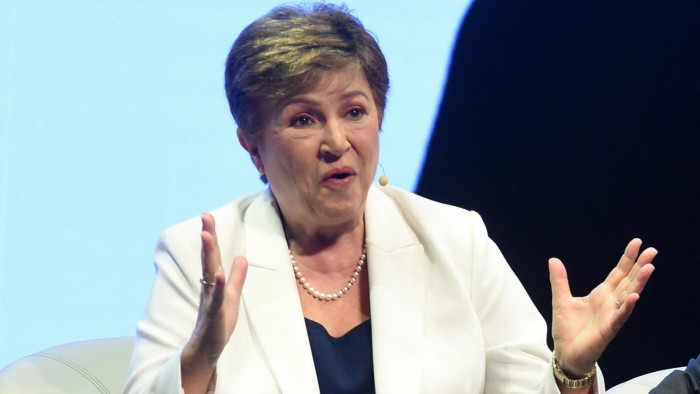Unlock the Editor’s Digest for free
Roula Khalaf, Editor of the FT, selects her favourite stories in this weekly newsletter.
The IMF’s in-house watchdog has criticised the fund over a lack of consistency in some of its biggest bailouts of the past two decades, calling on officials to address claims they succumb to political pressures to back big, risky repeat borrowers.
Rules for outsized loans to countries such as Argentina, Ukraine and Egypt needed an overhaul as “perceptions of a lack of even-handedness” were affecting the fund’s credibility, the IMF’s independent evaluation office said in a report on Thursday.
The report casts light on one of the thorniest issues facing the IMF, as the Washington-based institution comes under pressure to balance mounting debt problems in more and more developing economies with the taxing of its resources by a small group of countries that it is struggling to wean off its support.
The fund’s biggest lending commitment is to Argentina, where President Javier Milei is seeking a new $10bn loan, on top of $44bn the country tapped since 2018 under the exceptional access rules. The country’s obligations to the IMF are so large that last year it tapped a renminbi swap line with the Chinese central bank to help repayments.
Ongoing IMF support for Ukraine is also a linchpin of Kyiv’s financing of its war effort against Russia’s invasion, while a fund loan to Egypt this year was seen as stabilising a key economy on the frontline of fallout from the Gaza war.
Kristalina Georgieva, the IMF managing director, said in response to the assessment that a fund review of the rules governing its biggest bailouts was “needed to ensure that the policy remains fit for purpose in an evolving global context”.
But she cautioned that the IMF still needs space for flexibility and that too many sweeping reservations about its commitments to countries such as Argentina and Ukraine could backfire, and weaken countries’ ability to return to markets.
The fund introduced a so-called “exceptional access policy” in 2002 to better regulate large bailouts that put bigger risks on IMF resources.
While the watchdog acknowledged the fund’s policy for so-called “exceptional access” cases, where a country borrows many times more than usual limits, has worked better than previous use of discretion, it “has not provided a substantively higher standard” compared to normal bailouts, the office said.
“The use of the [policy] at times may have led to delaying debt resolution problems and it has not catalysed private financing to the extent the fund envisaged when it was adopted,” it added.
Under a long-standing policy, countries have had to pay surcharges, or extra interest, on IMF lending above a set quota, in order to discourage large repeat borrowings. The fund reformed the surcharges this year, including a cut to the rate.
“Outside the fund, there is a strong perception of political pressures in some high-profile cases affecting the assessment” of bailouts under the exceptional access rules, the IEO said.
The IMF often faces criticism that it bows to big shareholders that often are also large lenders to countries in trouble.
In October, Brent Neiman, the US Treasury Assistant Secretary for International Finance, said the fund needed to be firmer in assessing bailouts where China was a big creditor.
The IEO report said its evaluation “confirms that pressures on staff and management, exerted directly or indirectly, were strong in high-stakes cases”.
The review did not find evidence that confirmed concerns that economic assumptions behind bailouts were “reverse-engineered” in order to get loans approved.
But it identified weaknesses in processes, such as when the IMF relied on political assurances ahead of elections that bailout conditions such as big spending cuts will be delivered.
It added that the fund also tended to wrongly assume that big bailouts would boost investor confidence in countries. “The expected confidence effects relied more on assumption than on analytical explanation,” the report said.
The assessment reviewed cases from 2002 up to the middle of last year, such as the IMF’s bailout of Greece at the start of the Eurozone crisis in 2010, and a 2015 loan to Ukraine after Russia annexed Crimea.
It also looked at so-called “grey zone” cases where the fund judges that a country’s debts are sustainable before it lends but cannot say so with high probability.
For grey zone cases in particular, Georgieva said “further reflection and review based on more recent data” was useful.
“We do not want to increase the risk of inadvertently raising prospects of deeper debt restructurings and increased losses,” Georgieva said.
Read the full article here




